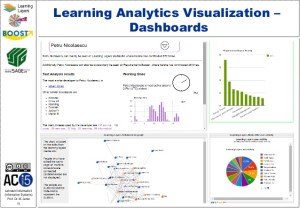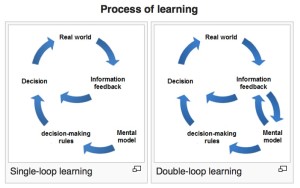Double Loop Learning and Learning Analytics
Another in this mini series on Learning Analytics. When looking at Work based learning, Double Loop Learning becomes particularly important. Double-loop learning is used when it is necessary to change the mental model on which a decision depends. Unlike single loops, this model includes a shift in understanding, from simple and static to broader and more dynamic, such as taking into account the changes in the surroundings and the need for expression changes in mental models.(Mildeova, S., Vojtko V. ,2003).
To remind readers again, in the EmployID European project we are aiming to support scalable and cost-effective facilitation of professional identity transformation in public employment services. And I would argue such identity transformation is based on refection on learning, on Double Loop Learning. Identity transformation necessarily involves the development of new metal models and new ways of looking at work based behaviours and practices.
So where does Learning Analytics fit into this? Learning analytics aims to understand and improve learning and the learning environment. This does not necessarily involve Double Loop Learning. For students feedback about their present performance may be enough. But if we aim for identity transformation and wish to improve the learning environment then we need a deeper interpretation of data. This has a number of implications in terms of designing Learning Analytics.
Firstly we have to have a very clear focus on what the purpose of the Learning Analytics is. Is it to find out more for example about informal learning in organisations or to inform L and D department staff about the Learning environment. Is it to help learners understand about their interactions with other staff or to examine their own dispositions for learning – and so on? Secondly – and crucially who is that data presented to users – be it learners or trainers. The existing parading for Learning Analytics presentations appears to be the dashboard. Yet in the LAk16 pre conference workshops there were a whole series of presentations where presenters invited participants to say what the graphics meant. And often we couldn’t. If LA professionals cannot interpret data visualisations then a leaner has little hope of making their own meanings. I am a little puzzled as to why dashboards have become the norm. And one of my major concern is that often it is difficult to understand the visualisation out of the context in which the learning exchange has happened. If Double Loop learning is to happen, then learners need to reflect in order to make meanings. And refection occurs best, I think, in the context in which it takes place.

Image: Ralph Klamma – http://www.slideshare.net/klamma/technical-challenges-for-realizing-learning-analytics
There are alternatives to the dashboard. For instance with EmployID we are developing real time discourse analysis and are also looking at providing dynamic prompts for reflection.>One final point. If we are aiming at using Learning Analytics for Double Loop Learning we need to find out what works and what does not. That means that any measure for Learning Analytics needs to be accompanied by well designed evaluation measures. All too often because LA collects data, it presumes to cover evaluation. Whilst both LA and evaluation may share data, they aim at different things.

